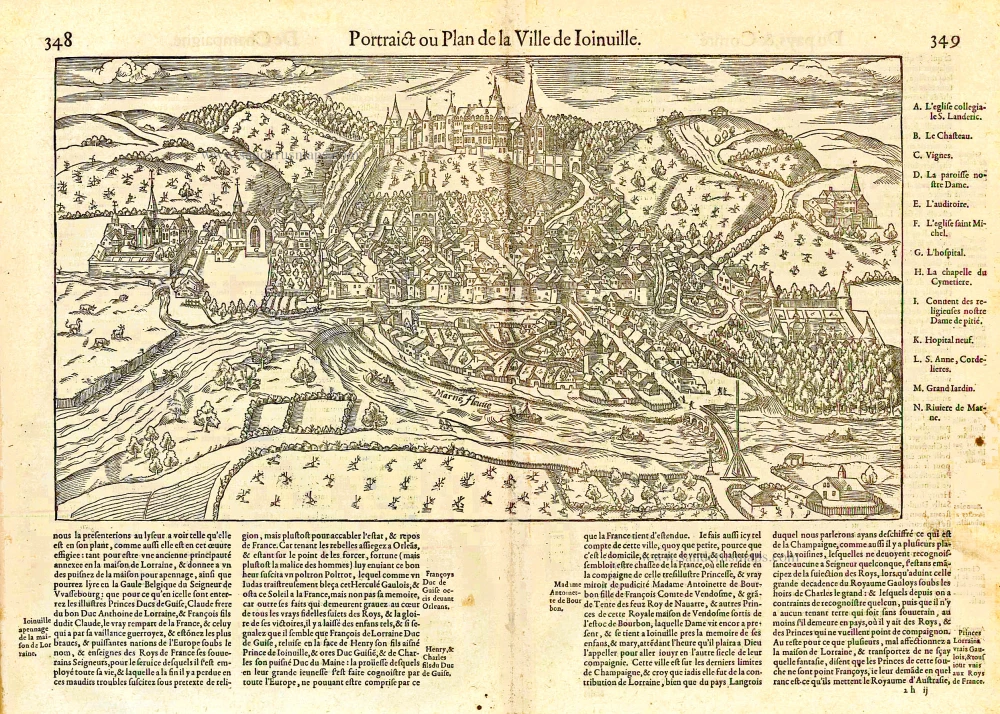Joinville by François de Belleforest 1575
The Cosmographie Universelle of F. de Belleforest was published in a shared edition by Nicolas Chesneau and Michel Sonnius. The objective of the two partners was to reprint Sébastien Münster's Cosmographie in French. Münster's work, published in Basel in 1544, had indeed been a great success and had known multiple reissues. It had been published in French in 1552, but Chesneau and Sonnius, noting that Münster had mainly treated his own country, Germany, wanted to satisfy the tastes of their compatriots more.
They appealed for the text of the work to François de Belleforest (1530-1583). Belleforest probably helped Chesneau and Sonnius in their quest for new city plans.
Belleforest's Cosmographie is presented in two parts, the first of which is divided into two volumes; each of the three volumes has its title. Some copies bear the imprint of Chesneau and others that of Sonnius.
Of the 163 plates in the Cosmographie, only 49 are copied from the work of Sebastian Münster. Little is known about the engravers of the Cosmographie. The name of Cruche appears only once, at the bottom of the plate of Paris. Raymont Rancurel is the second known engraver in the Cosmographie. In 1572 appeared, the first volume of the Civitates Orbis Terrarum of Braun and Hogenberg. Twenty of these plates were copied by the Cosmographie of Belleforest.
Pourtraict ou Plan de la ville de Joinville.
Item Number: 27175 Authenticity Guarantee
Category: Antique maps > Europe > France
Old, antique bird's-eye view plan of Joinville, by François de Belleforest.
Ancienne vue à vol d'oiseau de Joinville, par François de Belleforest.
Date de la première édition: 1575
Date de cette carte: 1575
Gravure sur bois, imprimée sur papier.
Dimensions (hors marges): 19 x 21cm
Verso: Texte français
État: Excellent.
Évaluation de l'état: A+
Références: Pastoureau, Belleforest I-1 [18]; Fauser, #6229
Origine: La Cosmographie Universelle de tout le Monde. Paris, Nicolas Chesneau - Michel Sonnius, 1575. (= Édition française de la Cosmographie de Münster).
La Cosmographie Universelle de F. de Belleforest fut publiée en édition partagée par Nicolas Chesneau et Michel Sonnius. L'objectif des deux associés était de réimprimer la Cosmographie de Sébastien Münster en français. L'ouvrage de Münster, publié à Bâle à partir de 1544, avait en effet connu un grand succès et de multiples rééditions. Il avait eu une édition en français dès 1552, mais Chesneau et Sonnius, constatant que Münster avait "principalement singularisé son pays d'Alemaigne" ont voulu satisfaire davantage les goûts de leurs compatriotes.
Ils firent appel pour le texte de l'ouvrage à François de Belleforest (1530-1583). Belleforest aida probablement Chesneau et Sonnius dans leur quête de nouveaux plans de villes.
La Cosmographie de Belleforest se présente en deux tomes dont le premier est divisé en deux volumes ; chacune des trois parties a son titre propre et peut donc être reliée séparément. Selon le principe des éditions partagées, certains exemplaires portent l'adresse et la marque de Chesneau, et les autres celles de Sonnius.
Sur les 163 planches de la Cosmographie, 49 seulement sont copiées sur l'œuvre de Sebastian Münster.
Des graveurs de la Cosmographie, on sait peu de choses. Le nom de Cruche apparaît une seule fois, au bas de la planche de Paris. Raymont Rancurel est le deuxième graveur connu de la Cosmographie.
En 1572 parut le premier tome des Civitates Orbis Terrarum de Braun et Hogenberg. Vingt de ces planches furent copiées par la Cosmographie de Belleforest. Les volumes postérieurs des Civitates empruntèrent par contre onze villes à l'ouvrage de Belleforest.
Du Theatrum orbis terrarum d'Abraham Ortelius (1570), Chesneau et Sonnius ont retenu des cartes plus modernes que celles de Münster. D'autres plans ont été copiés sur les Plantz et pourtraitz d'Antoine Du Pinet ou sur les petites cartes de Camocio.
The Cosmographie Universelle of F. de Belleforest was published in a shared edition by Nicolas Chesneau and Michel Sonnius. The objective of the two partners was to reprint Sébastien Münster's Cosmographie in French. Münster's work, published in Basel in 1544, had indeed been a great success and had known multiple reissues. It had been published in French in 1552, but Chesneau and Sonnius, noting that Münster had mainly treated his own country, Germany, wanted to satisfy the tastes of their compatriots more.
They appealed for the text of the work to François de Belleforest (1530-1583). Belleforest probably helped Chesneau and Sonnius in their quest for new city plans.
Belleforest's Cosmographie is presented in two parts, the first of which is divided into two volumes; each of the three volumes has its title. Some copies bear the imprint of Chesneau and others that of Sonnius.
Of the 163 plates in the Cosmographie, only 49 are copied from the work of Sebastian Münster. Little is known about the engravers of the Cosmographie. The name of Cruche appears only once, at the bottom of the plate of Paris. Raymont Rancurel is the second known engraver in the Cosmographie. In 1572 appeared, the first volume of the Civitates Orbis Terrarum of Braun and Hogenberg. Twenty of these plates were copied by the Cosmographie of Belleforest.

